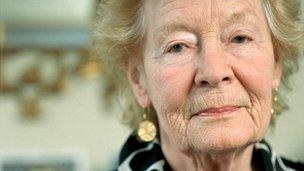Author Nina Bawden dies aged 87
- Published
- comments

Author Nina Bawden, who wrote the novel Carrie's War as well as more than 40 other books for children and adults, has died aged 87.
Published in 1973, Carrie's War was her most famous work, based on her World War II evacuation to south Wales.
She was also nominated for the Booker Prize in 1987 for Circles of Deceit.
In 2002, her husband was killed and she was badly injured in the Potters Bar train crash. She died at her London home on Wednesday surrounded by family.
Bawden was regarded as one of the few modern novelists to write successfully for both adults and children, and was admired for her insightful depictions of childhood and complicated family relationships.
She once said she liked writing for children because "most people underestimate their understanding and the strength of their feelings and in my books for them I try to put this right".
Writer PD James once called her "among the most perceptive and accomplished novelists writing today".
Playwright Sir David Hare, who portrayed Bawden in his play The Permanent Way, paid tribute to her as "an uncomplicatedly good woman, whose long fight to obtain justice for the victims of the Potters Bar crash was a model of eloquence, principle and human decency".
Bawden's publisher Lennie Goodings called the author "a gently fierce, clever, elegant, wickedly funny woman".
"She wrote slim books but they were powerful and extraordinarily acute observations about what makes us human," Goodings said. "She was a wonderful storyteller and she was writing to the end."
Francesca Dow, managing director of Penguin children's division, described Bawden as "a wonderful storyteller, brilliant at stepping into the minds of her characters and conjuring up a powerful sense of time and place".
Author Valerie Grove added: "Nina Bawden is one of the most admirable women I know, and why she was never made a Dame, I can't imagine."
Born Nina Mary Mabey in Ilford, Essex, in 1925, Bawden was evacuated at the age of 14, first to Ipswich and then south Wales.
The experience provided the template for Carrie's War, about the girl sent to live in a mining town, which was later added to the school curriculum. It was adapted twice for television by the BBC, while a stage production ran in the West End in 2009.
'New society'
Bawden often used personal experience or family stories in her work. Her first children's book, The Secret Passage, published in 1963, was written for her three children after they discovered a secret passage in their cellar.
The Peppermint Pig, which won the Guardian Children's Fiction Prize in 1976, was based on an old family tale, while The Outside Child told the story of a girl who discovered she had a half-brother and sister from her father's first marriage.
That followed the revelation, when in her 20s, that Bawden had a half-sister who had been sent away to live with cousins.
Her other novels included The Birds on the Trees, which was shortlisted for the Lost Man Booker Prize for the best books published in 1970, and Granny the Pag.
Towards the end of World War II, Bawden won a scholarship to Somerville College, Oxford, where she read politics, philosophy and economics alongside Margaret Roberts, later Baroness Thatcher.
Bawden was a member of the Labour Party and told the future Conservative prime minister they should "use our good fortune to make sure that, when the war ended, a new, happier, more generous society would take the place of the old one".
Bawden had hoped to become a journalist and, after graduating, was offered a job as a trainee reporter on the Manchester Evening News. But she turned it down when she married Harry Bawden and became pregnant.
Their child, Niki, grew up to suffer schizophrenia and become involved in drugs. He killed himself in 1981, aged 33.
He provided the basis for one of the characters in Bawden's Booker-shortlisted novel Circles of Deceit.
In 1954, Bawden was remarried, to Austen Kark, whom she had met on a bus.
On 10 May 2002, the couple were on their way to an 80th birthday party in Cambridge when their train derailed at high speed after leaving King's Cross.
Kark, who had risen to become managing director of the BBC World Service, died in the crash, while his wife suffered a broken ankle, arm, leg, shoulder, collarbone and ribs.
She campaigned to get answers after the accident, and received almost £1m in compensation from Network Rail and former rail contractor Jarvis.
In one of Bawden's last books, Dear Austen, the author told the story of the crash in the form of letters to her late husband.
Bawden was made a CBE in 1995 and received the prestigious ST Dupont Golden Pen Award for a lifetime's contribution to literature in 2004.
Her literary agent noted that, shortly before her death, the author was "delighted to learn that Macmillan's Bello imprint is to reissue her early crime books, including her first novel".
He added: "We have all lost someone very beloved."
- Published23 August 2012
- Published15 May 2006
- Published8 May 2003
- Published11 June 2002
- Published25 March 2010
- Published11 February 2011